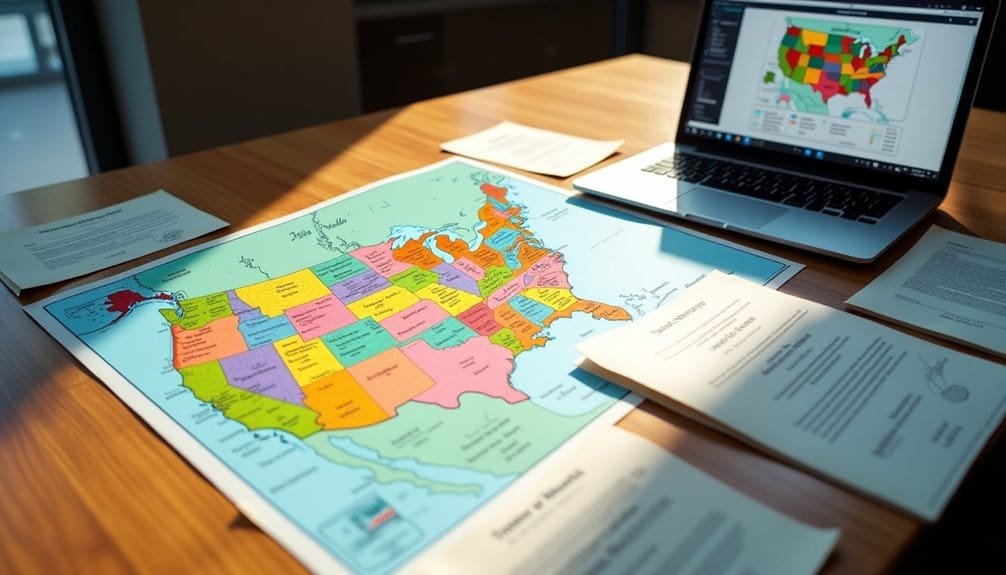To obtain a real estate license, you’ll need to meet various state-specific requirements, which typically include being at least 18 with a high school diploma or GED. Expect fingerprinting and a background check, costing between $15 and $80. Pre-license education varies, with states like Virginia requiring 60 hours and Pennsylvania demanding 75 hours. Some states have reciprocity agreements, making it easier to transfer licenses. Becoming a broker requires additional courses and at least three years of experience. Maintaining your license involves continuing education, ensuring you’re up to date. These insights prepare you for the next vital steps toward licensure.
Key Takeaways
- State-specific pre-license education hours vary, with requirements ranging from 60 to 99 hours.
- Fingerprinting and background checks are mandatory, with fees between $15 and $80.
- Reciprocity varies, with some states offering full, partial, or no reciprocity agreements.
- Continuing education is required for license renewal, focusing on legal updates and professional development.
- Licensing exams must be passed, and application fees vary by state.
General Licensing Criteria

To become a licensed real estate agent, you need to meet several general licensing criteria that vary by state. An essential aspect of this process is undergoing a fingerprinting and background check. These checks are either state-specific or national, and they assess your eligibility for licensure. Fingerprinting fees range from $15 to $80, contributing to the overall cost of your application. The Real Estate Commission in each state reviews any criminal offenses on a case-by-case basis, ensuring that only qualified individuals receive a license. License portability allows practice in another state without a local license, typically for professionals in neighboring states. Age and education also play a significant role in qualifying for a real estate license. Most states require you to be at least 18 years old, and you must have a high school diploma or GED. However, some states like Montana may have different requirements, such as only needing a 10th-grade education.
When you apply, you’ll need to submit various documents, including your educational background and details about your sponsoring brokerage. Errors and Omissions Insurance is required in 30 states to protect you against potential claims related to professional service errors. Application fees vary, with Colorado charging as low as $45, while California’s fees reach $245. Additionally, you must provide fingerprints, a background check, and proof of passing the real estate exam to complete the application process.
See Requirements for All 50 States
| State | Requirements (Age, Education, Exam, Other) |
|---|
| Alabama | Authority: Alabama Real Estate Commission Age: 19+ Education: 60 hours pre-licensing coursework Exam: Pass state & national exams Other: US citizen or lawful permanent resident; fingerprint-based background check; must have high school diploma or equivalent |
| Alaska | Authority: Alaska Real Estate Commission Age: 19+ Education: 40 hours pre-licensing coursework Exam: Pass state & national exams Other: Fingerprint and background check; must have high school diploma or equivalent |
| Arizona | Authority: Arizona Department of Real Estate Age: 18+ Education: 90 hours pre-licensing + 6-hour contract writing course Exam: Pass state & national exams Other: Fingerprinting; Arizona-specific background check; high school diploma or equivalent |
| Arkansas | Authority: Arkansas Real Estate Commission Age: 18+ Education: 60 hours pre-licensing coursework Exam: Pass state & national exams Other: Background check; high school diploma or GED |
| California | Authority: California Department of Real Estate Age: 18+ Education: Three courses (Real Estate Principles (45 hrs), Real Estate Practice (45 hrs), plus one elective (45 hrs)) totaling 135 hours Exam: Pass state exam Other: Fingerprinting; background check; proof of legal presence in the US |
| Colorado | Authority: Colorado Division of Real Estate Age: 18+ Education: 168 hours pre-licensing coursework Exam: Pass state & national exams Other: Fingerprinting and background check; must have high school diploma or equivalent |
| Connecticut | Authority: Connecticut Real Estate Commission Age: 18+ Education: 60 hours pre-licensing coursework Exam: Pass state & national exams Other: Background check may be required; high school diploma or equivalent |
| Delaware | Authority: Delaware Real Estate Commission Age: 18+ Education: 99 hours pre-licensing coursework Exam: Pass state & national exams Other: Fingerprints and background check; high school diploma or equivalent |
| District of Columbia | Authority: DC Real Estate Commission Age: 18+ Education: 60 hours pre-licensing coursework Exam: Pass DC and national exams Other: Background check; high school diploma or equivalent |
| Florida | Authority: Florida Department of Business & Professional Regulation Age: 18+ Education: 63 hours pre-licensing coursework Exam: Pass state exam Other: U.S. Social Security number; high school diploma or equivalent; electronic fingerprinting |
| Georgia | Authority: Georgia Real Estate Commission Age: 18+ Education: 75 hours pre-licensing coursework Exam: Pass state & national exams Other: High school diploma or GED; criminal history report |
| Hawaii | Authority: Hawaii Real Estate Commission Age: 18+ Education: 60 hours pre-licensing coursework Exam: Pass state & national exams Other: High school diploma or equivalent; may require background check |
| Idaho | Authority: Idaho Real Estate Commission Age: 18+ Education: Two pre-licensing courses totaling 90 hours Exam: Pass state & national exams Other: Fingerprinting and background check; high school diploma or equivalent |
| Illinois | Authority: Illinois Department of Financial & Professional Regulation Age: 18+ Education: 75 hours (60 hours pre-license + 15 hours interactive) pre-licensing coursework Exam: Pass state & national exams Other: High school diploma or equivalent; background check |
| Indiana | Authority: Indiana Real Estate Commission Age: 18+ Education: 90 hours pre-licensing coursework Exam: Pass state & national exams Other: High school diploma or GED; background check |
| Iowa | Authority: Iowa Real Estate Commission Age: 18+ Education: 60 hours pre-licensing coursework plus three 12-hour courses in listing/buying/practical measures (total 96 hours) Exam: Pass state & national exams Other: Background check; high school diploma or equivalent |
| Kansas | Authority: Kansas Real Estate Commission Age: 18+ Education: 30-hour Principles of Real Estate course + 30-hour Practice course (60 hours total) Exam: Pass state & national exams Other: Fingerprint and background check; high school diploma or equivalent |
| Kentucky | Authority: Kentucky Real Estate Commission Age: 18+ Education: 96 hours pre-licensing coursework OR a degree in real estate Exam: Pass state & national exams Other: Background check; high school diploma or GED |
| Louisiana | Authority: Louisiana Real Estate Commission Age: 18+ Education: 90 hours pre-licensing coursework Exam: Pass state & national exams Other: Background check; high school diploma or equivalent; errors and omissions insurance required after licensing |
| Maine | Authority: Maine Real Estate Commission Age: 18+ Education: 55 hours Sales Agent Course Exam: Pass state & national exams Other: High school diploma or equivalent; background check |
| Maryland | Authority: Maryland Real Estate Commission Age: 18+ Education: 60 hours pre-licensing coursework Exam: Pass state & national exams Other: Background check and fingerprinting; high school diploma or equivalent |
| Massachusetts | Authority: Massachusetts Board of Registration of Real Estate Brokers and Salespersons Age: 18+ Education: 40 hours pre-licensing coursework Exam: Pass state & national exams Other: Social Security number; no specific diploma requirement by statute, but must be of good moral character |
| Michigan | Authority: Michigan Department of Licensing and Regulatory Affairs Age: 18+ Education: 40 hours pre-licensing coursework (4 hrs of civil rights law & fair housing included) Exam: Pass state exam Other: Background check; high school diploma or equivalent recommended |
| Minnesota | Authority: Minnesota Commerce Department Age: 18+ Education: 90 hours (three 30-hr courses) pre-licensing coursework Exam: Pass state & national exams Other: Background check; high school diploma or equivalent |
| Mississippi | Authority: Mississippi Real Estate Commission Age: 18+ Education: 60 hours pre-licensing coursework Exam: Pass state & national exams Other: High school diploma or GED; background check |
| Missouri | Authority: Missouri Real Estate Commission Age: 18+ Education: 48-hour pre-exam course + 24-hour Missouri Real Estate Practice Course (72 hours total) Exam: Pass state & national exams Other: Fingerprint and background check; high school diploma or equivalent |
| Montana | Authority: Montana Board of Realty Regulation Age: 18+ Education: 70 hours pre-licensing coursework Exam: Pass state & national exams Other: Background check; high school diploma or equivalent |
| Nebraska | Authority: Nebraska Real Estate Commission Age: 19+ (or 18 with additional requirements) Education: 66 hours pre-licensing coursework (two courses) or real estate degree Exam: Pass state & national exams Other: Fingerprints and background check; high school diploma or equivalent |
| Nevada | Authority: Nevada Real Estate Division Age: 18+ Education: 90 hours pre-licensing coursework (45 principles, 45 law) or 120 hours (if applying after July 1, 2023) Exam: Pass state & national exams Other: Fingerprints and background check; high school diploma or equivalent |
| New Hampshire | Authority: New Hampshire Real Estate Commission Age: 18+ Education: 40 hours pre-licensing coursework Exam: Pass state & national exams Other: Criminal record check; high school diploma or equivalent |
| New Jersey | Authority: New Jersey Real Estate Commission Age: 18+ Education: 75 hours pre-licensing coursework Exam: Pass state & national exams Other: Fingerprinting and background check; high school diploma or GED |
| New Mexico | Authority: New Mexico Real Estate Commission Age: 18+ Education: 90 hours (3 courses of 30 hrs each) pre-licensing Exam: Pass state & national exams Other: Fingerprints and background check; high school diploma or equivalent |
| New York | Authority: New York Department of State, Division of Licensing Services Age: 18+ Education: 77 hours pre-licensing coursework (effective as of recent updates) Exam: Pass state exam Other: Must be sponsored by a licensed NY broker; no diploma requirement stated, but generally must be of good moral character |
| North Carolina | Authority: North Carolina Real Estate Commission Age: 18+ Education: 75 hours pre-licensing course Exam: Pass state & national exams Other: Criminal record check; high school diploma or equivalent |
| North Dakota | Authority: North Dakota Real Estate Commission Age: 18+ Education: 45 hours pre-licensing coursework Exam: Pass state & national exams Other: Background check; high school diploma or equivalent |
| Ohio | Authority: Ohio Division of Real Estate & Professional Licensing Age: 18+ Education: 120 hours (4 courses of 30 hrs each) pre-licensing Exam: Pass state & national exams Other: High school diploma or GED; fingerprinting and background check |
| Oklahoma | Authority: Oklahoma Real Estate Commission Age: 18+ Education: 90 hours pre-licensing coursework Exam: Pass state & national exams Other: Fingerprint-based background check; high school diploma or equivalent |
| Oregon | Authority: Oregon Real Estate Agency Age: 18+ Education: 150 hours pre-licensing coursework Exam: Pass state & national exams Other: Fingerprinting; background check; high school diploma or GED |
| Pennsylvania | Authority: Pennsylvania State Real Estate Commission Age: 18+ Education: 75 hours pre-licensing coursework Exam: Pass state & national exams Other: High school diploma or GED; background check |
| Rhode Island | Authority: Rhode Island Department of Business Regulation Age: 18+ Education: 45 hours pre-licensing coursework Exam: Pass state & national exams Other: Background check; high school diploma or equivalent |
| South Carolina | Authority: South Carolina Real Estate Commission Age: 18+ Education: 90 hours pre-licensing (60 hrs Unit I + 30 hrs Unit II) coursework Exam: Pass state & national exams Other: Background check; high school diploma or GED |
| South Dakota | Authority: South Dakota Real Estate Commission Age: 18+ Education: 116 hours pre-licensing coursework Exam: Pass state & national exams Other: Background check; high school diploma or equivalent |
| Tennessee | Authority: Tennessee Real Estate Commission Age: 18+ Education: 90 hours (60 hrs Basic Principles + 30 hrs Course for New Affiliates) Exam: Pass state & national exams Other: High school diploma or GED; fingerprinting and background check |
| Texas | Authority: Texas Real Estate Commission Age: 18+ Education: 180 hours pre-licensing coursework Exam: Pass state & national exams Other: Fingerprint and background check; high school diploma or equivalent not explicitly required but must meet honesty, trustworthiness standards |
| Utah | Authority: Utah Division of Real Estate Age: 18+ Education: 120 hours pre-licensing coursework Exam: Pass state & national exams Other: Fingerprinting; background check; high school diploma or equivalent |
| Vermont | Authority: Vermont Real Estate Commission Age: 18+ Education: 40 hours pre-licensing coursework Exam: Pass state & national exams Other: Background check; high school diploma or equivalent |
| Virginia | Authority: Virginia Department of Professional and Occupational Regulation, Real Estate Board Age: 18+ Education: 60 hours pre-licensing coursework Exam: Pass state & national exams Other: Fingerprinting and background check; high school diploma or equivalent |
| Washington | Authority: Washington State Department of Licensing Age: 18+ Education: 90 hours (60-hr course + 30-hr course) pre-licensing Exam: Pass state & national exams Other: Fingerprinting and background check; high school diploma or equivalent |
| West Virginia | Authority: West Virginia Real Estate Commission Age: 18+ Education: 90 hours pre-licensing coursework Exam: Pass state & national exams Other: Fingerprint and background check; high school diploma or equivalent |
| Wisconsin | Authority: Wisconsin Department of Safety and Professional Services Age: 18+ Education: 72 hours pre-licensing coursework Exam: Pass state & national exams Other: Background check; high school diploma or equivalent |
| Wyoming | Authority: Wyoming Real Estate Commission Age: 18+ Education: 54 hours pre-licensing coursework Exam: Pass state & national exams Other: Background check; high school diploma or equivalent |
Pre-License Education Requirements
Steering through the pre-license education requirements for a real estate license demands careful attention to the specific criteria set by each state. In Virginia, aspiring salespersons must complete 60 hours of education, while brokers face a rigorous 180-hour requirement, including specific coursework in appraisal, finance, and law.
Delaware requires 99 hours for salespersons, whereas the District of Columbia mandates 60 hours.
Pennsylvania’s pathway involves 75 hours, divided into Real Estate Fundamentals and Real Estate Practice, and brokers need 240 hours.
In New York, prospective salespersons also need 75 hours, though specific course details aren’t outlined. Additionally, some states like Pennsylvania allow substitution of college courses or alternative education paths to meet the pre-license education requirements.
It’s important to note that Board-approved courses are mandatory for licensing in Virginia, ensuring that all aspiring real estate professionals meet consistent educational standards.
Accreditation is essential in some states. Virginia insists on Board-approved courses or equivalent university credits. Similarly, Pennsylvania’s courses must meet approval from the PA Real Estate Commission or an accredited college.
While New York doesn’t specify course approval, Oregon requires 150 hours from approved providers.
In states like Kentucky, 96 hours or six college credit hours suffice for salespersons. Remember, requirements like high school diplomas in D.C. or background checks in North Dakota and Florida might also apply.
Understanding these diverse prerequisites guarantees you’re well-prepared on your journey to obtaining a real estate license.
Post-License and Continuing Education

Maneuvering the requirements for post-license and continuing education is vital for maintaining your real estate license and staying updated in the industry. After earning your license, you’ll need to complete post-license education within a specific timeframe, typically ranging from 6 months to 2 years.
For instance, in Florida, sales associates must finish 45 hours within 18-24 months, while brokers need 60 hours. Georgia requires 25 hours within the first year, whereas in Alabama, it’s 30 hours within 6 months to a year.
Virginia mandates 30 hours within the first year, and in Pennsylvania, 14 hours are needed for the first renewal. Each state has unique Post-Licensing requirements, so it’s crucial to understand the specific mandates applicable to your state to ensure compliance. It is important to note that post-license education is distinct from continuing education and must be completed before your first license renewal. Establishing a clear vision and setting SMART goals for your educational journey can help you stay organized and focused.
| State | Hours Required |
|---|---|
| Florida | 45 (Sales), 60 (Broker) |
| Georgia | 25 |
| Alabama | 30 |
| Virginia | 30 |
Continuing education is essential for license renewal, focusing on legal updates and professional development. Requirements vary by state, often including specific course topics like Fair Housing and Ethics. Non-compliance can lead to an inactive license, affecting your ability to renew. Fortunately, online courses through board-approved providers can make this process more flexible. Completing your education on time guarantees your license remains active and compliant.
Reciprocity and Transfers
Maneuvering the complexities of real estate license reciprocity and transfers can greatly enhance your career mobility. Understanding which states offer full reciprocity is essential. For instance, Alabama only requires you to complete a 6-hour course and submit a license application. In Colorado, the process involves minimal additional requirements, making it an attractive option. Georgia, however, mandates the state portion of the exam unless you’re from Florida. Reciprocity agreements differ significantly across states, meaning it is crucial to stay informed about the latest changes to ensure compliance.
For states with partial or selective reciprocity, research specific agreements. Iowa collaborates with states like Arkansas and Georgia, while Kentucky has ties with Florida and Illinois. Maryland’s agreements include Oklahoma and Pennsylvania, whereas Nevada works with Arizona, Colorado, and others. Pennsylvania requires maintaining a principal office in one of its partner states. Notably, states with full reciprocity allow agents to bypass extensive licensing procedures, underscoring the importance of understanding state-specific rules.
If you’re eyeing states with no reciprocity, such as Alaska, California, or New Jersey, be prepared to undergo the full licensing process. Verify your current license is active and in good standing to qualify for reciprocity. Many states necessitate passing a state-specific exam, and while some offer education waivers, others impose residency requirements. Finally, reciprocal licenses often align with your original license type.
Limited Agreements

Maneuvering the domain of limited reciprocity agreements in real estate licensing requires a strategic approach. Different states have varied agreements, impacting how you pursue a license across state lines.
For instance, Kentucky forms limited agreements with Florida, Illinois, Ohio, Tennessee, and West Virginia, while Iowa partners with Arkansas, Georgia, Louisiana, Massachusetts, Minnesota, Mississippi, and North Dakota. Connecticut has agreements with several states including Alabama and Colorado.
Understanding these distinctions is vital when planning your career move. Depending on the state, you may need to comply with specific conditions such as submitting your license history, undergoing background checks, and passing state-specific exams.
You might also need to complete additional pre-licensing education and hold an active license in good standing. It’s crucial to comply with state regulations to ensure legal practice in real estate. Be mindful of specific conditions like residency requirements, time frames for holding a license, and, in some cases, necessary courses like contract writing.
Here’s a helpful summary:
| State | Number of Agreements | Examples |
|---|---|---|
| Kentucky | 5 | FL, IL, OH, TN, WV |
| Iowa | 7 | AR, GA, LA, MA, MN |
| Connecticut | 12 | AL, CO, FL, GA |
These insights help you navigate the complex world of limited agreements with confidence.
Brokerage Licensing Essentials
Building on the understanding of limited reciprocity agreements, gaining a real estate brokerage license demands a concrete grasp of specific educational and experiential milestones. First, you’ll need to complete a 60-hour Real Estate Principles and Practices course, a 15-hour Real Estate Brokerage Principles and Practices course, and a 15-hour Legal Compliance course. Additionally, you’ll take two 15-hour pre-license elective courses, or alternatively, one 30-hour elective course. If you’ve completed 20 real estate transactions in the last five years, a 30-hour elective may suffice.
Experience is equally vital. You must have been actively engaged as a licensed real estate salesperson for at least three years, accruing 1,500 hours under a licensed broker. Confirm you’ve closed at least four real estate transactions within the three years preceding your application. Your supervising broker must certify this engagement within 90 days.
Passing the state licensing exam is essential. Submit your application with the $120 fee, plus a $59 examination fee. Examination eligibility lasts a year, and your license must activate within two years of passing. Remember, broker licenses expire every even year on November 30th, requiring renewal through continuing education.
Frequently Asked Questions
- Prepare for Loan Maturities and Refinancing Waves as a Real Estate AgentIn mastering loan maturities and refinancing waves, uncover strategies every real estate agent needs to empower clients during pivotal financial transitions.
What Are the Costs Associated With Taking the Real Estate Exam?
When you’re preparing for the real estate exam, expect to pay varying exam fees, ranging from $15 in New York to $150 in Texas. Additionally, background check and fingerprinting fees can add $100 to $125. Licensing and application fees vary, with California reaching up to $400. Total costs differ by state, so it’s essential to plan your budget accordingly. Understanding these costs guarantees you’re financially prepared for this career step.
How Long Does It Take to Process a Real Estate License Application?
Did you know that processing times for a real estate license in Ontario can vary widely, from 4-6 months, depending on several factors? The duration of your educational program, whether full-time or part-time, directly influences this timeframe. Completing background checks and licensing exams can add weeks to the process. To speed up the application, guarantee all documentation is complete, and consider accelerated study options to minimize delays and efficiently navigate the licensing journey.
Are There Any Online Options Available for Pre-License Education?
Yes, you can find online pre-license education options in Virginia through various approved schools. These courses offer flexible learning schedules, allowing you to choose between self-paced and livestream formats. They include interactive tools, videos, and case studies, ensuring thorough coverage of real estate principles. Courses are accessible from any device and provide support through email, phone, and Q&A sessions, making them convenient and effective for preparing for the real estate license exam.
What Study Materials Are Recommended for the State Real Estate Exam?
Imagine preparing for a marathon; you wouldn’t just run the day before. Similarly, studying for the state real estate exam requires preparation. Use resources like Test-Guide for practice exams, and Real Estate License Wizard for state-specific questions. Engage with StudyRealEstate’s interactive games to deepen your understanding. Remember, consistency is key—review prelicensure materials and stay updated on state-specific laws. With dedication, you’ll cross the finish line successfully.
Can I Use My Real Estate License in Multiple States Simultaneously?
You can use your real estate license in multiple states, but it depends on each state’s reciprocity agreements. Some states offer full reciprocity, allowing you to practice without additional exams, while others require a state-specific exam or courses. You’ll need to apply for licensing in each state and meet their requirements, which may include background checks. This process expands your market reach but involves understanding different state regulations and costs.
Bottom Line
Steering through the maze of real estate license requirements, state by state, might seem intimidating, but it’s a journey well worth taking. With each state offering its own tapestry of rules, understanding these nuances guarantees you’re equipped to succeed. From educational prerequisites to reciprocity deals, your path is lined with opportunities to grow and adapt. Embrace this challenge with confidence, knowing each step brings you closer to revealing a rewarding career in real estate across the nation.






